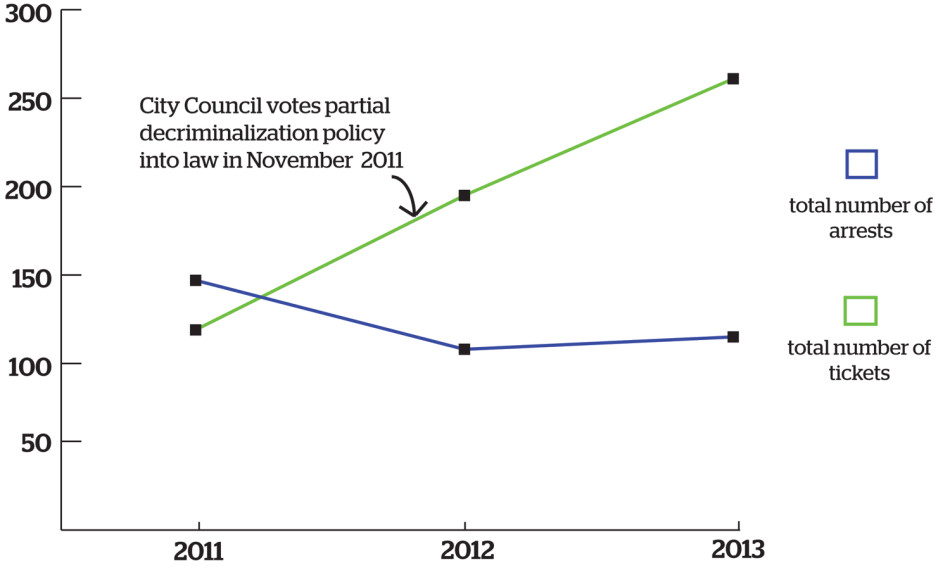Study reveals Evanston uptick in tickets for marijuana possession, decrease in arrests
May 26, 2014
Evanston police ticketed those charged with possession of a small amount of marijuana more often in 2013 than they arrested them, according to a study released last week.
In Evanston, 69 percent of people were ticketed in Evanston for the violation and 31 percent arrested. Just 7 percent in Chicago were ticketed for the same offense and the remaining 93 percent were arrested, according to a study published May 19 by the Illinois Consortium on Drug Policy at Roosevelt University.
The lower number of arrests in Evanston, which decreased 46 percent from 2012, according to the study, is the result of a change to the city’s controlled substance ordinance that City Council passed in November 2011, Evanston Police Department Cmdr. Jay Parrott said.
(Change in Evanston marijuana policy results in fewer physical arrests)
“The officers are using their discretion and applying the ordinance change. … It’s much quicker to process somebody with a ticket as opposed to a physical arrest,” Parrott said. “It’s easier, it takes less time and it allows for the officer to be finished quicker with processing the individual so they can be up and available to respond to emergency calls or other types of service that we do.”
The ordinance currently states that individuals found with less than 10 grams of marijuana will be issued a notice of violation, directing them to appear at an Evanston administrative adjudication hearing, where the appropriate punishment is determined. Those found in possession of more than 10 grams go to Cook County Circuit Court. Before the policy change, individuals found in possession of any amount of marijuana were arrested and adjudicated by the county court.
The new ordinance saves time for police officers, who do not need to make appearances at administrative hearings, Parrott said.
The new policy means Evanston has partially decriminalized marijuana possession. Federal and Illinois law still deem possession an offense punishable by prison time. Parrott said the new city ordinance allows for officers to decide whether to ticket or arrest individuals, depending on the circumstances of specific cases.
“The law is marijuana’s still illegal,” Parrott said. “We have to take enforcement action against it … We’re still holding people accountable and that needs to be done. People should not be standing out on the corner smoking marijuana.”
The city ordinance was also intended to avoid giving permanent criminal records to those found with small amounts of marijuana when a fine or community service could be a suitable punishment, he said.
Weinberg senior Marko Pavisic presented a proposal to City Council in March for changes to Evanston’s controlled substance policy that has similar goals. Prison, as a punishment for nonviolent offenses, has an unfairly destructive effect on people’s lives, he said.
(Evanston to examine drug code reforms)
“There’s a scourge in society that destroys individuals, families and communities and that’s incarceration,” Pavisic told The Daily. “That’s sort of why I found a connection with the drug policy movement.”
Pavisic is a former co-president of Northwestern’s chapter of the Students for Sensible Drug Policy. At the March council meeting, he proposed that Evanston implement three reforms to help lower the rate of incarceration for drug-related offenses in the city. He suggested all marijuana charges be met with administrative adjudication and fines scaled to match the amount of cannabis found on the individual.
However, Pavisic said he doesn’t think the reforms will be passed by the city to further decrease prison time for marijuana possession. Although police expressed support for issuing tickets over arrests, the discrepancy between local and Illinois law remains, he said.
“Northwestern students tend to go through the administrative adjudication process for the (10) grams or less,” he said. “Meanwhile, people who aren’t Northwestern students tend to go to prison … People can still get arrested under the state law.”
Pavisic’s drug policy reforms are on the agenda to be presented at the city’s Human Services Committee meeting on June 2, which Pavisic plans to attend.
The study also revealed that Evanston demonstrated a high level of disproportionate minority contact in charging individuals for marijuana possession. Despite the ticketing being identified as a way to potentially reduce the negative impact of disproportionate minority contact, the study said ticketing ordinances didn’t result in any real changes in the numbers.
“Say a white Northwestern student gets (caught), they’re going to get a ticket,” Pavisic said. “If some kid down on Howard (Street) gets arrested for it, they could get a record.”
Email: [email protected]
Twitter: @paigeleskin


